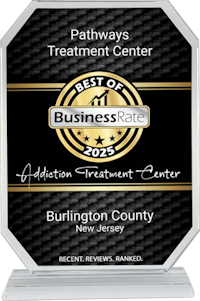
Both programs provide similar benefits. However, to determine whether outpatient vs inpatient rehab is best for you, consult the Pathways admissions team. Thankfully, we provide all the guidance, direction, and thorough assessment you need, so you don’t have to worry about these details. We encourage you to review the following guidance and treatment details to get peace of mind about choosing the right program for you.
What is Outpatient Treatment?
Outpatient treatment programs are for individuals who require high-level care but with lower monitoring necessities of their condition and symptoms. This means there are no overnight stays at an approved medical facility. In turn, this treatment affords you flexible opportunities to maintain a busy lifestyle without compromising your quality of care. These sessions, though they can be administered at a treatment facility, are often conducted outside the office in a setting of the patient’s choosing. For more information regarding outpatient therapy or intensive outpatient treatment, contact us now for a thorough consultation.
What is Inpatient Treatment?
Inpatient rehab is the highest level of care with the strictest monitoring parameters and doctoral attentiveness. In these daily sessions, you’ll have full-time access to our therapists, recovery tools, medication aids, and support group resources. Thus, these programs are for individuals who require more hands-on help and training to get them to the next level of rehab. If you’re unsure which treatment is best for you, our devoted care receptionists are ready to point you in the right direction.
What are the Differences Between Outpatient Vs Inpatient Therapy
As mentioned, both options have similar benefits. However, they serve different purposes for different levels of care. That said, here are the main differences between outpatient vs inpatient therapy.
Inpatient services require treatment to be done at an on-site facility, while outpatient therapy does not. This affords maximum flexibility for OP patients to pick a relaxed environment for their sessions to be conducted. The reason for this discrepancy is the elevated monitoring requirements for people going through inpatient treatment. This precaution ensures that the proper safety and monitoring processes are being implemented.
Outpatient care also permits maximum schedule flexibility, while inpatient sessions are strictly an all-day affair. Therefore, with outpatient treatment, you not only get location flexibility, but also timing flexibility with a schedule that works for you. Due to the location and time constraints, as well as the monitoring necessities of inpatient care, you are not afforded those same opportunities.
There’s a stark difference between how therapists approach training implementation in outpatient vs inpatient treatment. Inpatient therapy centers around in-depth training and teaching practices to make them part of your natural impulses. Outpatient treatment focuses on lifestyle implementation practices of all the training involved in IOP and other rehab program training lessons.
The transition from all-day inpatient sessions to maintaining sobriety within the parameters of daily life is quite an adjustment. That’s why one of the main differences between inpatient and outpatient treatment is also one of outpatient therapy’s greatest benefits. Our dedication specialists go the extra mile in outpatient therapy to aid this transition by easing you into maintaining a well-rounded, healthy, and sober lifestyle. This includes nutrition plans to maintain a healthy neurobiological balance, relapse prevention techniques, and other practical, personalized lifestyle teachings.
Naturally, getting treatment at an on-site location all day means you have greater attentiveness and monitoring of your progress. While both provide the same care quality, nothing matches the high-level attentiveness and monitoring required by inpatient therapy. To clarify, in-session therapeutic attentiveness never wavers, but the full-time therapist access required by inpatient care is unmatched. Speak to a representative today to see if you require care with more or less monitoring.
While both types of treatment have varying durations and session frequencies based on personal needs, inpatient therapy is typically shorter. Inpatient rehab takes around a month for thorough completion, while outpatient programs last as long as three months. Inpatient therapy frequency is usually five days per week, but can be six or seven, depending on necessity. Outpatient care, on the other hand, has a five-day maximum with meetings typically lasting a couple of hours per session. This is as opposed to the typical five to eight-hour meetings with inpatient rehab.
How To Choose The Best Treatment Program for You
There are very important factors to consider when choosing between outpatient vs inpatient therapy. If you’re unsure where to start, the factors below, in conjunction with professional guidance, will make your choice sure.
The most important thing to consider when choosing any rehab program is honest self-evaluation. This means coming to terms with the nature of your struggle and current addiction condition. Only then can you accurately gauge your current condition and know which program caters most to your circumstances. Once you’ve come to an honest self-evaluation, the answer will be much clearer.
In line with honest self-evaluation, seek professional medical assessment and be openly honest with your assessment specialist. Your treatment efficacy is dependent upon your level of transparency with our empathetic treatment team. As long as you are completely open about your background, needs, and goals, you won’t have to stress about which program is best for you.
Sometimes it takes the observation of a close third party to open your eyes to your needs. That’s one of the many reasons why your closest friends and family play a key role throughout your recovery. The first step begins with getting advice from them about where you should start. Nobody knows you better on a more personal level than those who are around you most. So seek advice and heed their suggestions about rehab.
We understand people lead busy lives that require more time and schedule-accommodating therapy options. That’s why some therapy programs offer more flexibility than others to help you maintain your job and other life obligations. Better yet, at Pathways Treatment Center, even with flexible therapy programs, you never get watered-down care. Whether you need inpatient or outpatient therapy, we maintain the same high-quality care you can come to expect with all our programs.
Consider which program fits into your budget, as outpatient treatment is usually cheaper than inpatient care. Nonetheless, Pathways Treatment Center believes you deserve the best quality treatment at affordable prices. That’s why we aim to individually tailor your personalized treatment experience in accordance with your budget and approved rehab insurance coverage. We add and subtract all the necessary ingredients that make your treatment the most effective, personalized, and cost-efficient. To see if your insurance plan qualifies for our maximum coverage cost, speak to an insurance verification expert today.

Benefits of Outpatient Treatment
Most of the benefits of outpatient care are outlined in the discrepancies. Nonetheless, here are the specified benefits of outpatient care to help you determine your most effective program.
- Treatment on Your Timeline: Unlike inpatient care, this therapy is done at a time of your convenience. Reach out to a representative today to begin scheduling your sessions.
- Treatment Where You Want It: As mentioned earlier, where your treatment is conducted is predominantly up to you. You can choose to have therapy sessions in a public setting or a private setting. This sets the atmospheric tone for the most accommodating and relaxing environment possible.
- Treatment at Your Pace: Whether you prefer shorter sessions or longer sessions, the choice is mostly up to you. This also means your progress is up to you, meaning the duration of your inpatient care is solely based on you. This ensures you are never rushed or pushed into your next phase of treatment prematurely.
- Maximum Application Efficacy: There’s no greater benefit than the practical application opportunities of outpatient care. These lessons are intended to implement the most advanced relapse prevention techniques.
Outpatient Addiction Treatment in NJ
Pathways Treatment Center is home to the most comprehensive addiction programs in the country, especially thriving in outpatient care. You’ll witness the full extent of our unparalleled recovery procedures, tools, and dedication to your sobriety. Contact us and witness top-tier care with the flexibility you need to maintain your lifestyle without sacrificing therapeutic quality.



